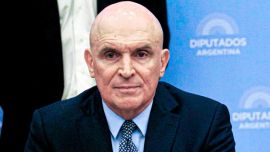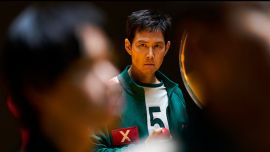Alfredo, the brother of Federal Judge Ariel Lijo became a father little more than two years ago. According to friends of the family, the magistrate did not visit the hospital after the birth or attend the baptism of his nephew. This is this argument that figures close to the judge use as they seek to isolate the “toxicity” and suspicion generated by the network of companies and deals that link the magistrate via his brother more intimately as Ariel bids to become a Supreme Court Justice.
Over the last few years, the Lijo brothers – “los hermanos Lijo” – have been nicknamed “los hermanos Lujo“ (“the luxury brothers”) or “los hermanos valijo (“the suitcase brothers”) in some quarters, alluding to their alleged expensive tastes.
This week all those rumours that circulated in the past have become current again as senators in Congress begin analysing the career of one of the judges with the most political ties in the Comodoro Py federal courthouse.
Lijo grew up in courts thanks to the family of former judge Gabriel Cavallo, his brother-in-law and colleague, in the 1990s, at the office of then-Appeals Court judge Luisa ‘Piru’ Riva Aramayo. Years later, Cavallo started leading Federal Court No. 4 and, in 2004, Lijo inherited the magistrate’s bench.
Lijo’s rising career as a judge had an economic complement in the life of his brother. During the same period, Alfredo ‘Freddy’ Lijo started raising horses, established an insurance company and even created companies overseas.
At this time, tournaments of the truco card game were organised at Freddy’s house at the Abril Country Club. Other judges attended, as did SIDE intelligence agents, such as Leonardo Bergroth (who travelled to Lago Escondido, along with judges, officials and Grupo Clarín directors, in a famous trip that made headlines).
The financial network of the Lijo brothers was exposed in a trial in which Freddy’s ex-wife, María Carla Lago, declared all of her ex-husband’s deals. One strange thing to come out of that testimony was that Lago had a fleet of Nextel phones in her name which were all used by Freddy, Ariel, Cavallo and prosecutor Eduardo Taiano. After the scandal, they all changed their phones.
Freddy was always considered a court operator within Comodoro Py. When in December 2014, under Cristina Fernández de Kirchner, the government’s intelligence system exploded amid the exit of Antonio ‘Jaime’ Stiuso from the Intelligence Secretariat, and the disgrace of then-operator Javier Fernández, Lijo became the government’s new self-proclaimed operator.
The idea was to imitate the work of the Stiuso-Fernández duo with the Olazagasti-Lijo duo. Olazagasti refers to José María Olazagasti, one of Lijo’s great friends, who was a personal secretary to former federal planning minister Julio De Vido.
Olazagasti, during Oscar Parrilli’s administration, had become a member of the Federal Intelligence Agency. Freddy Lijo was convinced that with his friend Olazagasti, he could rebuild the operation – a court operator walking the corridors of courts and a partner within the Intelligence Agency to coordinate tasks.
It was all thwarted by the change of government.
Lijo’s nomination to the Supreme Court was news to the political system which mostly gave him their blessing, except for a few who criticised the magistrates, including Coalición Cívica deputies, who cited as example the fact that their leader Elisa ‘Lilita’ Carrió has previously reported the judge.
Yet, right now, at this moment, political and court operators alike claim that Lijo could well get the votes to grab one of the spots in the Supreme Court. Crucially, two of the main players in Argentine politics have not yet expressed themselves on the issue: former presidents Cristina Fernández de Kirchner and Mauricio Macri.
In Fernández de Kirchner’s case, giving the green light for her senators to vote in favour of Lijo is very complex. The former president has been denouncing a judicial persecution system against her and her former officials over the last few years.
She suspects it has been headed by Supreme Court Justice Ricardo Lorenzetti and seconded by Appeals Court judge Martín Irurzun, who gave the legal backing to trial judges – chief among them Claudio Bonadio, Julián Ercolini and Lijo himself – to push ahead.
Macri heard about Lijo’s nomination while in Bologna, Italy, giving lectures at a university. No-one consulted him beforehand, but he does not have good references for Lijo.
Yet there is something playing in Lijo’s favour in this discussion: Macri and Fernández de Kirchner both reject Supreme Court President Horacio Rosatti. With Lijo’s entrance in the Supreme Court, they take it for granted that it could end the three-to-one majority (Rosatti, Carlos Rosenkrantz and Juan Carlos Maqueda against Lorenzetti) could end. With Maqueda soon to depart, Lijo joining the court could see the votes switch to two-to-two.
A question emerges: what will the Senate do with the government’s other candidate, Manuel García Mansilla?



















Comments